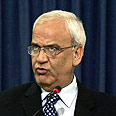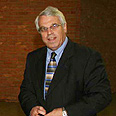

Erekat: 6 months to peace deal
Top negotiator for Palestinian Authority says solutions at hand for all core issues, now is time for decision-making. Speaking at conference organized by Peres Center for Peace, Erekat says 'Israeli and Palestinian leaders who reach an agreement will be more important to region's history than Jesus'
"If we want a peace agreement – there are only six months left. This is the time to make decisions," Saeb Erekat said on Thursday evening.
Speaking at a conference organized by the 'Peres Center for Peace' at Tel Aviv University, the top negotiator for the Palestinian Authority was joined for a discussion on the recent renewal of Israeli negotiations with Syria by MK Yossi Beilin (Meretz) and former director-general of the Foreign Affairs Ministry, Dr. Alon Liel.
"Our goal is to reach an agreement. Regarding the core issues: Jerusalem, the refugees and the borders – all these have solutions. This is the time for decisiveness. We will not go back to talks over temporary arrangements or temporary border, we intend to reach an agreement and this is possible for all the core issues. We need to make decisions, and (Prime Minister) Olmert and (Palestinian President) Abbas are capable of making them.
"The 'Israeli and Palestinian leaders who reach an agreement will be more important to region's history than Jesus," said Erekat.
"Ultimately the only solution possible is that of two states in the 1967 borders. Like it or not, you have three options: two states, a bi-national state, and the current situation," said Erekat, alluding to an 'apartheid state.'
The senior Palestinian diplomat also addressed the situation in the Gaza Strip: "We want the truce in Gaza to hold. It is good to give a chance for peace, and the calm is necessary for us."
As for the indirect negotiations with Syria, Erekat said: "I hope the Israeli-Syrian channel is successful. We want Syria to be involved in the peace process because we would like to see a final arrangement for the entire region."
'Assad – driving force behind talks'
Alon Liel said that success with the Syrian channel would have a positive effect on the Palestinian one.
"If we reach an agreement with Syria before we do with the Palestinians, there will be several elements aiding the Palestinian channel – like the issue of the refugees for instance. Syria will apparently agree to grant the refugees citizenship," he said.
"I know that there's a lot of panic in Lebanon about this issue, as they fear that the Palestinian refugees will be settled there as well and alter the country's demographics. What's more, the Syrians will no longer allow Khaled Mashaal (Hamas' exiled politburo chief) to remain in Damascus. If we reach a stage where Syria stops aiding Hamas and Hizbullah, the balance of power will shift in Fatah's favor and this will help the peace process."
The former director-general of the Foreign Affairs Ministry said noted that the "driving force" behind the renwed talks with Syria was none other than Syrian President Bashar Assad himself. Olmert, said Liel, would not have initiated the negotiations.
"I believe the reason for this is that Assad is afraid of Iran. The Syrians know exactly who the Iranians are, just as we do. They also know how dependent they've become in fields like military strength and their economy. I believe they came to the conclusion that they were under a 'friendly takeover' by Iran, and that
Iran may yet do to them what they did in Lebanon."
Liel said that only the United States would be able to broker a regional agreement with Syria that would block its "Iranization.
"After that, with the help of the Syrians, we will be able to come to the public and ask them something very simple: 'What do you prefer – having Israel surrounded by an Iranian belt in Lebanon, Syria and the Gaza Strip – or a friendly belt that will normalize relations with us and agree to end the conflict?"















